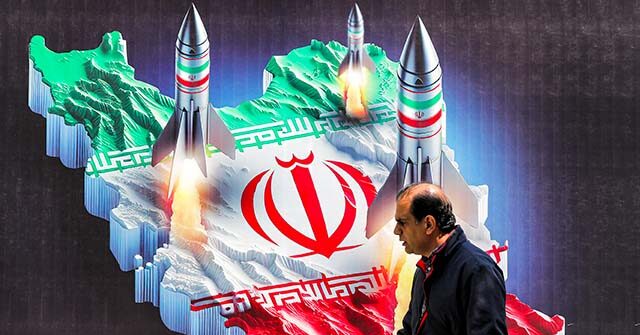President Donald Trump signed an executive order Tuesday that reinstates the “maximum pressure” policy on Iran that he implemented during his first term.
The “maximum pressure” executive order was part of a larger package of executive orders that included several foreign policy initiatives, such as withdrawing America from several United Nations agencies including the Human Rights Council and UNESCO. Much of the pressure will be financial, as the executive order tasks the Department of the Treasury to implement sweeping sanctions to keep money out of the pockets of the Iranian regime.
Iran is the world’s premier state sponsor of terrorism, funding and controlling a complex web of jihadist entities including Hamas, Hezbollah, a host of Iraqi Shiite militias, and the Houthi terrorists of Yemen. In 2o18, a State Department study estimated that Iran spends as much as $1 billion a year funding terrorism.
“Iran spends $700 million a year on Lebanese Hezbollah. It gives another $100 million to various Palestinian terrorist groups, including Hamas,” then-Ambassador-at-Large and Coordinator for Counterterrorism Nathan Sales told reporters. “Combined with the money that Tehran provides to other terrorists, the total bill comes close to $1 billion a year.”
During his first term as president, Trump similarly implemented onerous sanctions on Iran that significantly limited its malign influence in the Middle East. Trump also designated the Islamic Revolutionary Guard Corps (IRGC), a wing of the Iranian military, a foreign terrorist organization, and eliminated IRGC Quds Force chief Qasem Soleimani in an airstrike in 2020. Soleimani was largely responsible for coordination among several major Iranian terror proxies, leaving Tehran’s efforts to control jihadist activity hampered.
As a result, the Iranian government has gone as far as to prosecute Trump and several members of his administration in absentia. In 2023, a Tehran court ruled that Trump, former Secretary of State Mike Pompeo, and several other officials must pay Iran $50 billion in compensation for the airstrike. The defendants have ignored the ruling entirely as of press time.
Several Iranian personalities have also called for Trump’s assassination; during Soleimani’s funeral in 2020, a speaker at the event suggested Iran should crowdsource $80 million to pay for someone to kill Trump.
Trump addressed Iran’s threats to his life while signing the executive order on Tuesday, warning Iran that killing him “would be a terrible thing for them to do.”
“Not because of me. If they did that, they would be obliterated. That would be the end,” Trump told reporters. “I’ve left instructions. If they do it, they get obliterated. There won’t be anything left.”
Trump has in the past used similarly ominous language against Iran.
“I would advise Iran not to start their nuclear program,” Trump warned in 2018, following Iran’s claims to pause nuclear weapons development as a result the 2015 nuclear agreement. “I would advise them very strongly. If they do, there will be very severe consequences.”
“If you fuck around with us, if you do something bad to us, we are going to do things to you that have never been done before,” Trump told the Iranian leadership during an appearance on late radio host Rush Limbaugh’s program in 2020.
The four years in between Trump’s two terms marked a seismic shift in American policies towards Iran. Former President Joe Biden implemented policies that offered Iran concessions in the hope that the radical Islamist regime would stop its terrorist activities. Almost immediately after taking office, in February 2021, Biden removed Ansarallah, the Houthis, from the U.S. list of designated foreign terrorist organizations, greatly expanding their financing abilities. Biden also allowed Iran to access $6 billion in funds frozen in South Korea, a move that his administration insisted was “not a ransom” despite the fact that it coincided with the release of five American hostages in the country. Biden also lifted sanctions on former Iranian officials in June 2021 claiming a “verified change in behavior or status.”
The windfalls to Iran preceded the worst terrorist attack in the history of modern Israel, committed by Iranian terrorist proxy Hamas on October 7, 2023. Hamas invaded Israel through its base in Gaza and conducted door-to-door raids of residential communities, killing entire families and engaging in torture, gang rape, abductions, and other atrocities.
Iran enthusiastically celebrated the attack, holding street parties and launching fireworks in Tehran on the night of October 7.
Follow Frances Martel on Facebook and Twitter.
Read the full article here


